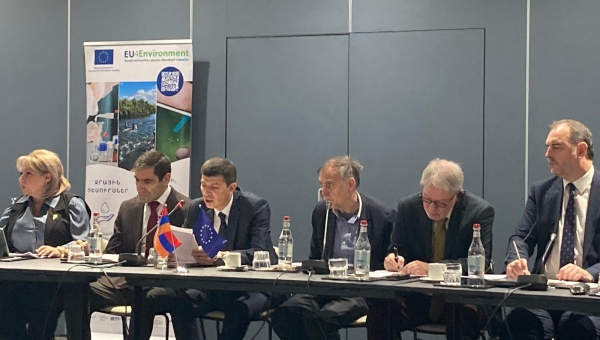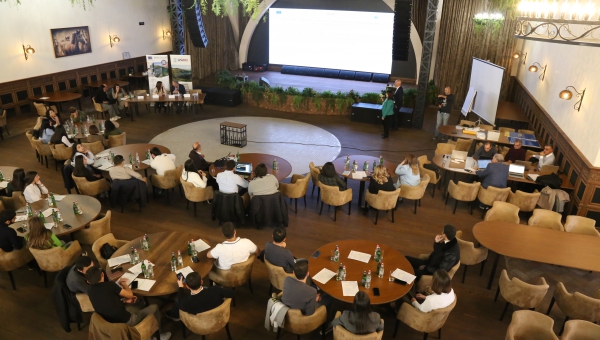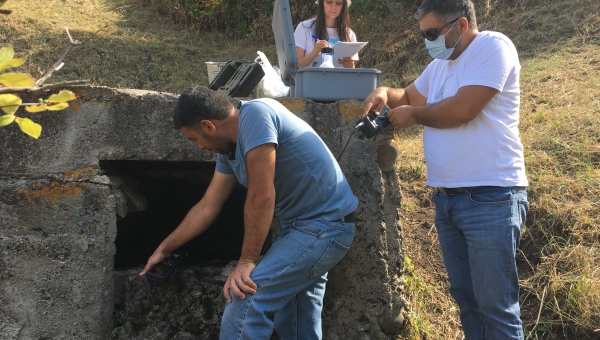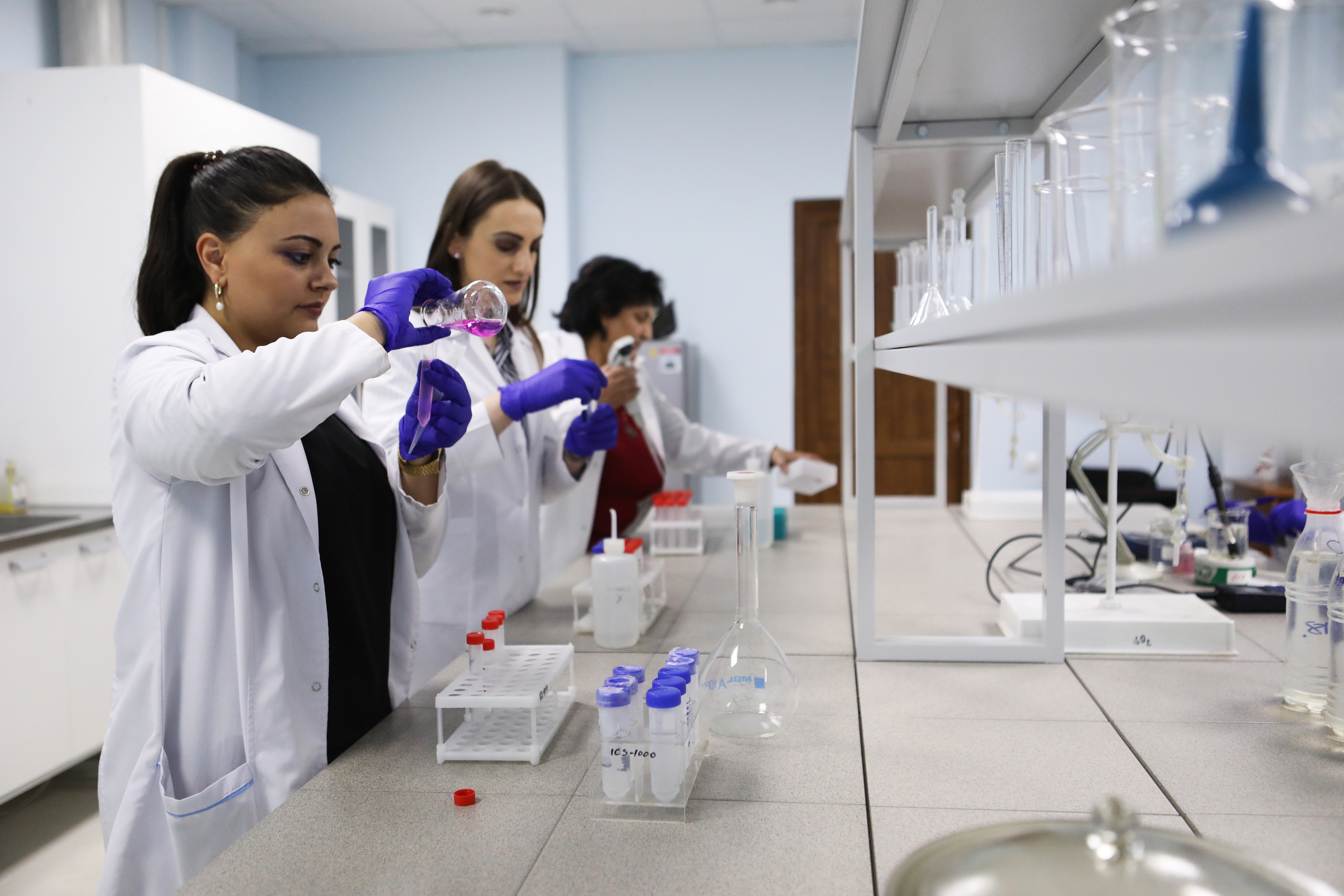- Country: Armenia
- Component: Other
- Activities : Other : Communication
News

- Country: Armenia
- Component: Water resources
On 4 December 2024, Armenia conducted its 22nd meeting of the National Policy Dialogue on Water. This regular cross-sectoral dialogue is part of the country’s long-standing efforts to reform water policies and practices along with national goals, EU and international commitments. This dialogue engages a broad representation of national and local government, academia and non-governmental stakeholders, as well as the international community.
Chaired by the Ministry of Environment and organised within the framework of the European Union for Environment - Water Resources and Environmental Data Programme, the meeting focused on the development of Armenia’s Water Strategy with a whole-of-government approach to addressing socio-economic development and resilience in the context of increasing pressures, including climate change. The participants discussed the progress made since the updated Water Code came into effect and the results from water-related projects. They also defined the next steps and priorities for the Water Strategy progression. Lessons learnt from the joint monitoring of surface and groundwater resources with Georgia in the Khrami-Debed basin, and the next steps were identified.
Lilit Abrhamyan, Head of the Water Policy Department of the Ministry of Environment, said: “The National Water Policy Dialogue, which has taken place in Armenia since 2006, is an important platform to discuss the priority issues in the water sector, ensure synergies and coordinate inter-sectoral policies. It is the perfect platform to progress with the development of the Water Strategy, which requires a whole of government consensus. By 2026, Armenia must fulfil several principal obligations undertaken according to the Comprehensive and Enhanced Partnership agreement with the European Union, and we expect that the strategy will drive progress here too. The National Water Policy Dialogue in Armenia will continue to play a crucial role in Armenia in the coming years as we track Strategy implementation.”
Mr Frank Hess, Head of the Cooperation Section of the EU Delegation to Armenia, stated: “We are strongly committed to furthering EU-Armenia relations. Working for the benefit of people and the environment is our shared goal. We are happy to see that, with EU support, river basin management planning, water monitoring and economics, data management, transboundary cooperation, and water and health agenda have all advanced and can inform the implementation of the new Strategy. Working towards the adoption and implementation of the Water Strategy will be key for strengthening water resilience, which becomes ever more important for our societies and our economies. This cannot be achieved without meaningful stakeholder dialogue.”
The meeting was attended by the members of Armenia’s Steering Committee for the National Policy Dialogue on Water. The cross-sectoral Committee consists of 35 members from the Ministry of Environment, Ministry of Territorial Administration and Infrastructures, Ministry of Finance, Ministry of Health, Ministry of Economy, Public Services Regulatory Commission, Regional Administrations and Universities, Institutes and NGOs. Representatives of the EU Delegation to Armenia and international projects and partners working in the Armenian water sector are also invited to attend the Committee’s meetings.
Speaking on behalf of the EU4Environment implementing partners, Mr Alexander Zinke, Environment Agency Austria, highlighted the Government’s commitment and action: “With support from the European Union and other international partners, Armenia has made significant policy reforms to tackle its water management challenges, and strengthened transboundary water cooperation, especially with Georgia. Acknowledging several good advances in integrated river basin management, further steps are needed. We believe that developing the new water strategy will stimulate wider political attention and become another momentum for various pending reforms, thus moving Armenia faster towards reaching its environmental goals.”
Background information
Driven by overdemand, mismanagement and the impacts of the triple crisis of climate change, biodiversity loss and pollution, water stress is increasing worldwide. At the same time, water is essential for the resilience of both societies and the environment.
In Armenia, water is a truly cross-sectoral issue touching all areas of the economy and the lives of citizens. Effectively handling water resources in a sustainable manner is thus crucial for the country's socio-economic progress. The revisions to the Water Code, which were adopted in July 2022, have set a strong foundation for continuing the water sector reforms.
Armenia has committed to reform water policies and practices as part of the Comprehensive and Enhanced Partnership Agreement (CEPA) with the European Union. This includes alignment with the EU water law, in particular, the Water Framework Directive (WFD).
For over a decade, the European Union has provided comprehensive support for reforming the water sector in Armenia. Both investment and technical support projects are ongoing.

- Country: Armenia
- Component: Environmental Data
On October 23-24, the first Water Data Hackathon was held in Armenia. The event, organized through the joint efforts of the European Union (EU4Environment - Water Resources and Environmental Data programme) and the U.S. Agency for International Development, in close cooperation with the Ministry of Environment of the Republic of Armenia, brought together 34 young people to collaboratively develop ideas for digital solutions aimed at the sustainable management of water resources.
Gayane Hovsepyan, head of the Water Resources Management Department at the RA Ministry of Environment, emphasized the importance of the initiative in actively involving young people in water resource management and making the field more attractive for emerging experts. She stated, "During these two days, young people presented many diverse and innovative ideas. We will further discuss, study, and definitely apply these ideas to manage water resources in the best possible way. I hope that the experience and knowledge gained during this time will inspire interest among young people, encouraging them to pursue careers in water resource management as specialists in the future."
Over the two days, participants had the opportunity to work with French experts from the International Office for Water (OiEau) partners of the EU4Environment - Water Resources and Environmental Data programme, from the USAID "Improved Water Management in Armenia" programme, and specialists from the Ministry of Environment of the Republic of Armenia. They deepened their knowledge of the field and acquired skills in data analysis, processing, and application.
The 3 top-performing teams will receive funding to further refine their ideas and transform them into digital solutions.
Pictures: Gayane Igityan

- Country: Armenia
- Component: Water resources
With the support of “EU4Environment – Water and Data Program” and UNECE, draft groundwater quality and quantity norms were developed in Armenia in 2024 as a major step towards harmonization with the principles and approaches of the EU Water Framework Directive. In the absence of such norms, classification of groundwater bodies was done using expert judgment, without any reference values or criteria to be compared against.
On November 15, 2024, the Government of Armenia officially approved the groundwater norms through Resolution No 1782-N, which makes it possible to classify groundwater bodies according to qualitative and quantitative status. The qualitative status (good, bad) is defined based on 45 chemical parameters, using the “One out, all out” principle. The quantitative status is defined based on the ratio of groundwater abstraction and the usable groundwater resources.
In the long term, these new norms will bring far-reaching benefits to environmental protection, public health, and economic development in Armenia. By assessing groundwater quality based on chemical parameters and evaluating its quantity in relation to abstraction, these norms enable the early identification of risks, such as overextraction or contamination. Additionally, they provide a basis for establishing environmental objectives as well as planning and implementing measures to improve groundwater status, ensuring sustainable management and protection of this vital resource.
For a detailed overview of the adopted groundwater standards and nitrate pollution control measures, consult the full report: Download the report - EU4Environment Groundwater Norms & Nitrate Zones in Armenia.
- Country: Armenia
- Component: Water resources
On 1 October 2024, Mrs. Madalina Laxton, from the European Commission, Directorate-General for Environment, and Mrs. Zuzana Sorocinova, from the EU Delegation in Armenia, visited the laboratory of the "Hydrometeorology and Monitoring Center" under the Ministry of Environment of Armenia. They were accompanied by Vahagn Tonoyan, the Armenian representative of the EU4Environment – Water Resources and Environmental Data programme.
During the visit, Levon Azizyan, the Director of the Hydrometeorology and Monitoring Center, welcomed the guests and provided an overview of several EU-funded initiatives that have been instrumental in upgrading Armenia’s environmental monitoring infrastructure. These include the EU Water Initiative Plus (2016-2029), EU4Environment – Water Resources and Environmental Data (since 2022), and EU4Sevan programmes. These efforts have contributed to the technical re-equipment of the laboratory, professional training for staff, laboratory accreditation, and the modernization of surface and groundwater monitoring stations, all in alignment with the EU Water Framework Directive (WFD).
The meeting provided an opportunity to discuss future steps in Armenia’s monitoring system development, particularly in areas covered by the EU-Armenia Comprehensive and Enhanced Partnership Agreement (CEPA), such as the Water Framework Directive and the Air Quality Directive. Levon Azizyan expressed gratitude for the continuous EU support and highlighted the importance of further collaboration to implement these key environmental directives.
Read more about the accreditation of the Armenian Water Laboratory on our website: https://eu4waterdata.eu/en/blog-news/30-armenia/370-armenian-water-laboratory-internationally-accredited.html



